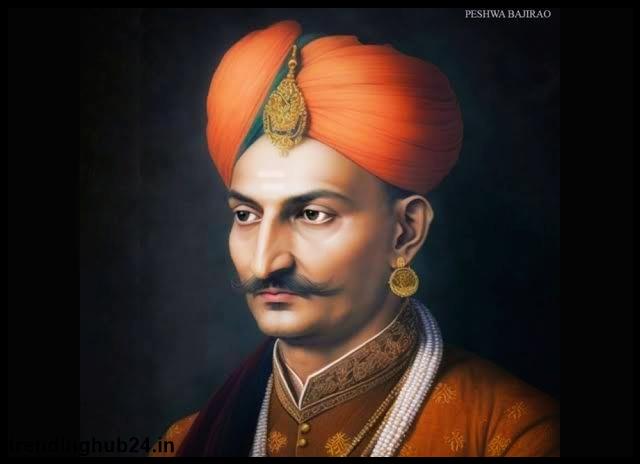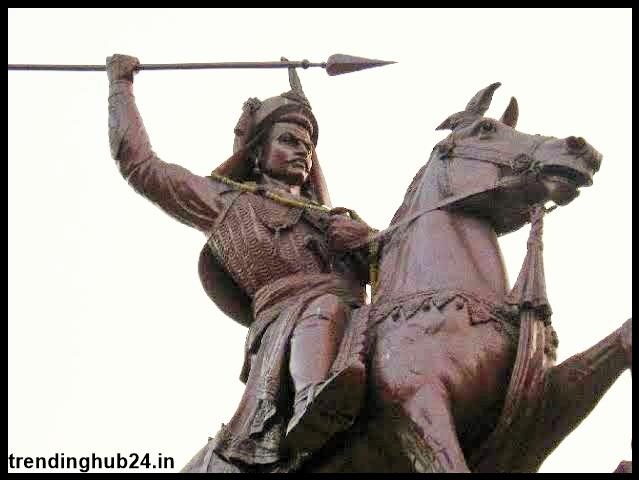🚀 Become a Verified Author on Trending Hub24
✍️ Author Account Available @ $60 / Month | +91 7355993756
Complete information about Peshwa Bajirao First

Unbeatable Warrior Peshwa Bajirao (I) / Birth Anniversary – August 18, 1700
Table of Contents
#Unbeatable Warrior Peshwa Bajirao (I)
Unbeatable Warrior Peshwa Bajirao (I) / Birth Anniversary – August 18, 1700.
Chhatrapati Shivaji Maharaj had freed a vast territory from the Mughals with his Bhujbal. After him, the name of the hero who had the most important contribution to maintaining this 'Swarajya' was Bajirao Peshwa.
Bajirao was born on August 18, 1700, in his maternal grandfather's village Duber. His grandfather Shri Vishwanath Bhatt had participated in wars with Shivaji Maharaj. His father Balaji Vishwanath was the Mahamatya (Peshwa) of Chhatrapati Shahu Ji Maharaj. It was on the strength of his bravery that Shahu ji increased the influence of Swarajya by defeating the Mughals and other opponents.
Bajirao loved war and politics since childhood. When he was six years old, his Upanayana ceremony took place. At that time he received many gifts. When he was asked to choose a gift of his choice, he chose a sword. Chhatrapati Shahu ji once pleased and gave him a precious necklace of pearls, and then he asked for a good horse in return. When taken to the stables, he chose the fastest and most obstinate horse. Not only this, by immediately tying a ride on him, he also gave indications of his future life.

At the age of fourteen, Bajirao started going to direct wars. He captured the Pandavgarh Fort situated at a dangerous height of 5,000 feet by climbing from behind. After some time, everyone got to know about his skills in a naval campaign against the Portuguese. On this Shahu ji gave him the title of 'Sardar'. After the death of Bajirao's father Vishwanath Peshwa on April 2, 1720, Shahu made 20-year-old Tarun Bajirao the Peshwa on April 17, 1720. As soon as Bajirao became Peshwa, he first attacked the Nizam of Hyderabad and licked the dust.
After this, after defeating Dawood Khan of Malwa, Mughal Sardar Dayabahadur of Ujjain, Mushtaq Ali of Gujarat, Muslim ruler of Chitradurga, and Sadullah Khan of Srirangapatna, Bajirao hoisted the saffron flag everywhere. With this, the limits of Swarajya extended from Hyderabad to Rajputana. Bajirao promoted young men like Ranoji Shinde, Malharrao Holkar, Udaji Panwar, and Chandroji Angre and made them skilled commanders.
In the fierce battle of Palkhind, Bajirao had defeated Nizamul Mulk, the minister of the Emperor of Delhi. British General Montgomery, who defeated the famous German commander Rommel in the Second World War, has counted it among the seven best battles in the world. In this, the Nizam was forced to enter into a treaty. Due to this war, Bajirao's fame spread throughout India. He helped veteran Chhatrasal in the war against Mohammad Khan Bangash and freed him from the captivity of Bangash. When the Turkish invader Nadir Shah got the news of Bajirao's arrival after looting Delhi, he returned.
When Bajirao, who was always invincible, was going to Delhi with the desire to fight Nadir Shah, on the way, at a place called Raverkhedi on the banks of Narmada, he died due to heatstroke in the hot and humid weather on April 28, 1740, at the young age of just 40. He died on His war strategy had only one principle: attack the root and the branches will collapse themselves. The palace situated in Shaniwar Bade of Poona still reminds me of his bravery.
#Shrimant Peshwa defeated Mubariz Khan in Shakarkhedla. (1724). Established dominance over Malwa and Karnataka (1724-26). Defeated Maharashtra's arch-enemy Nizamul Mulk in Palkhed (1728) and recovered Chauth and Sardeshmukhi from him. Then he attacked Malwa and Bundelkhand and defeated Mughal commanders Girdhar Bahadur and Daya Bahadur (1728). Subsequently, Muhammad Khan defeated Bangash (1729). He suppressed internal opposition by bowing to Trimbakrao in Dabhoi (1731). Seedi, Angriya the Portuguese, and the British were also badly defeated. The Delhi campaign (1737) was the pinnacle of his military prowess. In the same year, Shrimantbajirao Peshwa again defeated the Nizam in Bhopal. Ultimately in 1739, he conquered Nasirjung.
#Bajirao I is known as a great cavalry commander and Bajirao's name comes among those great warriors in history who never lost a battle in his life Bajirao I never lost a single battle in his life and this is his greatness. It reflects. According to American historian Bernard Montgomery, Bajirao Peshwa was the greatest general in the history of India, and how he defeated the Nizam's forces in the Palkhed battle, only Bajirao I could have done so.
Apart from him, no one else in India or the Indian subcontinent could do all this. Bajirao I and his brother Chimaji Appa also saved the people of the basin from the tyranny of the Portuguese who were forcibly converting people and bringing European civilization to India. Due to this, he sent his brother Chimaji Appa in his last days in 1739 to defeat the Portuguese and get the Treaty of Vasai done. In 1720 AD, Chhatrapati Shahu appointed Bajirao I as the Peshwa of the Maratha Empire, after which many big ministers became angry with him, due to which he started bringing young chieftains with him, which included Malharrao Holkar, Ranojirao Shinde even today. All these together allowed Bajirao I to establish his influence over the entire India. His first biggest victory was in the battle of Palkhed in 1728 in which he brought the Nizam's forces completely to the banks of the marshy river. Now the Nizam had nothing else to do but surrender. There was nothing left. And on 6 March 1728, he signed the treaty of Mungi Shevgaon.
Nizam with Hyderabad under which he gave the right to take Sardeshmukhi and Choth in the lid. Shahu was declared the real Chhatrapati of the Maratha Empire and Sambhaji II was the Chhatrapati of Kolhapur. After that, Bajirao fought many more battles but in 1737, Bajirao attacked Delhi and he defeated Saadat Ali Khan's army, which was about one lakh strong, and by using his tactics, people dodged him and went towards Delhi. He left Chimaji Appa with an army of about 10,000 to stop the Nizam and just reached Delhi in front of the Red Fort where Mohammad Shah, who was so frightened by the Mughal Emperor after seeing him, went and hid somewhere. After looting there, Bajirao returned to Pune. Returned where Mohammad Shah Rangeela wrote to Saadat Ali Khan and the Nizam of Hyderabad that you should stop Bajirao before Pune. Bajirao faced the Nizam near Bhopal in which Bajirao's army defeated both the armies and reached Bhopal. As a result of the treaty, the entire area of Malwa was given to the Marathas, due to this, the influence of Marathas was established in the whole of India. Bajirao got Shaniwar Wada constructed in Pune in 1730 and appointed Pune as the capital of the country.

